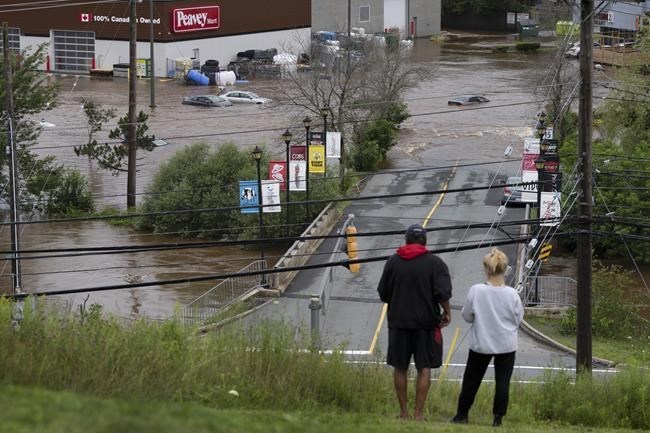FREDERICTON — The fingerprints of climate change are all over the supercharged weather witnessed this year in Nova Scotia -- and the rest of the country -- from raging wildfires to devastating flooding.
A series of punishing thunderstorms dumped up to 250 millimetres of rain on Nova Scotia this weekend, killing at least two people and damaging infrastructure across the province. About two months ago, nearly 250 square kilometres of land was scorched by record wildfires. The province is also experiencing summer temperatures that are warmer than usual.
There is a correlation between rising temperatures, wildfires and heavier rainfall, said Kent Moore, an atmospheric physics professor at the University of Toronto.
Rising temperatures lead to drier conditions, increasing the risk of wildfires, he said, but the warmer weather also augments the atmosphere's ability to hold moisture, leading to heavier downpours that can cause flooding.
Four people, including two children, were reported missing Saturday when the two vehicles they were travelling in were submerged in water northwest of Halifax. RCMP on Monday said they recovered the body of a 52-year-old man from Windsor, N.S., in the main search area northwest of Halifax, while the second person's remains were found “by civilians” on shore in a tidal area in the neighbouring county.
The heavy rain left behind a trail of 25 damaged or destroyed bridges, and about 50 wrecked roads.
Nova Scotia is about two degrees warmer than usual for this time of the year, Moore said. And as Nova Scotia and the rest of the planet heat up, the atmosphere's ability to hold water vapour increases, he added.
"Water vapour is what produces clouds, and also produces rain. It is like an engine for weather."
The last time Nova Scotia got more than 250 mm of rain -- 296 mm fell on Aug. 15-16, 1971 -- hurricane Beth hit the province. But Nova Scotia might not have to wait another 50 years for a similar weather event, Moore said, as extreme weather becomes more frequent.
"Scientists have predicted for many, many years that as we continue to pump greenhouse gases into the atmosphere, we're going to see a warming, and that will probably lead to more extreme conditions," he said.
"When we talk about global warming, the impacts of that changing or increasing temperature, is we're going to see more fluctuations, we're going to see extreme events — extreme dry events, and also extreme rain events. And that's what Nova Scotia has seen so far this year."
Each of the weather events -- wildfires, heat and floods -- is unusual and each does not necessarily follow the other, said John Clague, a professor of geosciences at Simon Fraser University, in Burnaby, B.C.
"But our changing climate is having an impact on all of them," he said.
"You begin to see the picture emerging that our changing climate is playing a role in the number and severity of these events. It's getting increasingly hard to deny that's happening."
Joseph Desloges, a professor at University of Toronto's earth sciences department, said the planet is on track to record one of the hottest years since scientists started documenting temperatures.
"Don't be mistaken," he said. "There have been heat waves before throughout history, but it's the persistence and the extreme nature of some of these that is concerning."
While climate change will bring about a more "energetic atmosphere," he said, this year is seeing a double whammy with El Niño -- characterized by warmer temperatures and wetter conditions -- and global warming, making the weather events drastic.
Clague said warmer oceans are implicated in the severe rain, from post-tropical storm Fiona, which hit the Maritimes in September 2022, to flooding over the weekend.
"We've always had storms that come in from the Atlantic and the Pacific," he said.
"But if the air is warmer, it can hold more moisture. When those moisture-laden air masses reach the coastline, they're going to dump more rain and you're going to have a greater likelihood of more severe flooding than you would otherwise."
Moore said every part of Canada is experiencing its own extreme weather condition right now, from record-high temperatures to wildfires, to rainfall. Montreal saw flooding from heavy rain about two weeks ago, and wildfires in British Columbia and Alberta have been fatal for firefighters, with smoke from the blazes reaching parts of the United States.
"The whole point is that the climate is warming up. The individual manifestations of that will be different," Moore said. "But, all parts of the country are experiencing extreme events."
Just as parts of Canada are seeing extreme weather this year, so is the world, he said. Heavy downpours along with deadly flooding hit parts of the United States, South Korea, India, Japan, China and Turkey. Greece is seeing devastating wildfires, while parts of Europe are experiencing some of the hottest temperatures they've ever had.
Canada and 196 other countries agreed to set national targets to cut greenhouse gas emissions to prevent the planet from warming up more than two degrees Celsius on average compared with pre-industrial levels in the 2015 Paris accord. Scientists across the world warned of extreme weather as global temperatures rise more than 1.5 degrees Celsius, Moore said.
"We're below 1.5 C and we're seeing these extreme events. What happens at 1.5 or two degrees?" he said. "That's what we need to be really concerned about."
This report by The Canadian Press was first published July 25, 2023.
-- With files from The Associated Press.
Hina Alam, The Canadian Press

